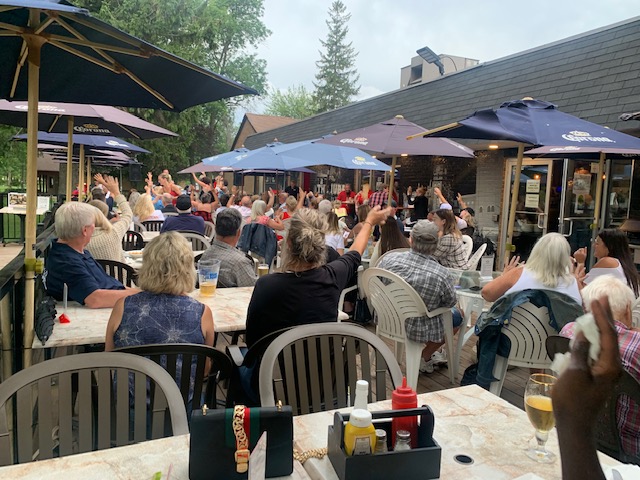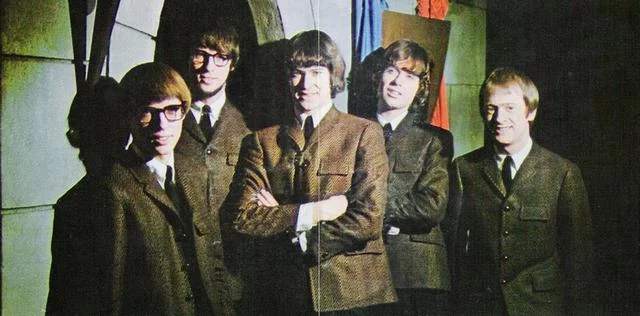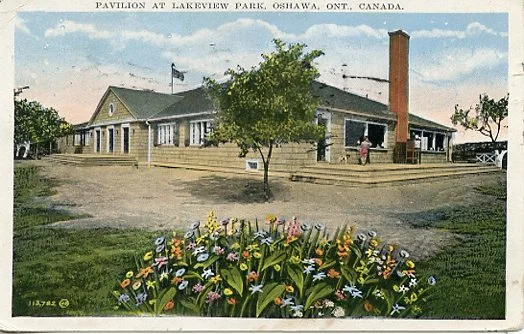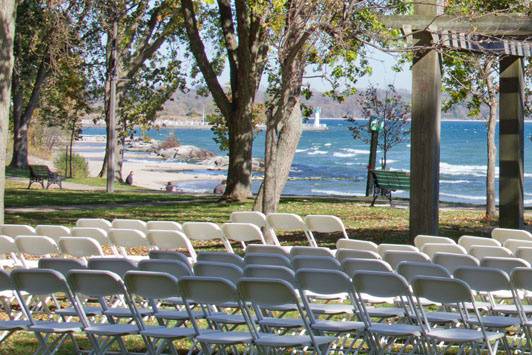The dance is still in swing at Oshawa’s 97-year-old lakeside Jubilee Pavilion
Published April 8, 2024 at 1:58 pm

For some, the Jubilee Pavilion on Oshawa’s lakefront is a spot to grab a hamburger for the kids in the summertime. Others think of the awesome wedding or corporate event they attended in the banquet hall inside, or perhaps the bands playing lakeside on Canada Day.
But for those with long memories, or those who have parents or grandparents who can tell them about it, the ‘Jube’ was THE place to be to catch bands, both up-and-coming as well as established, as they toured through southern Ontario, or dance the night away to jazz, big band and swing in one of the premier dance halls of the era.
The Jubilee attracted the big boys of the big bands, like Glenn Miller and his Orchestra, Guy Lombardo and the Royal Canadians and Bert Niosi (Canada’s ‘Swing King’), and when rock ‘n roll held sway, brought in acts like Bill Haley & the Comets, Rush, April Wine, The Spoons, Burton Cummings, The Headpins, Rough Trade and Lighthouse.
They even brought in Motown’s biggest stars in The Supremes in 1963 for a famous one-night stand on one of their ‘Record Hops’ for the princely sum of $150.
(Three years later the group played Toronto’s O’Keefe Centre – now Meridian Hall – with a 17-piece orchestra for $25,000.)
Mars Bonfire (AKA Dennis Edmonton, AKA Dennis McCrohan) was a little young for the swing bands but remembers the rest, as his father, Owen McCrohan, managed the Jube from 1932 until his death in 1981.

Oshawa band Jack London and the Sparrows, with two McCrohan brothers in the fold, would later change their name to Steppenwolf
Bonfire (who turns 81 in a couple of weeks) is best remembered as a member of the seminal rock band Steppenwolf and the man who wrote the rock and roll anthem ‘Born to Be Wild while hiking in the desert behind the Hollywood Hills.
But in the 1950s he was just the kid peeling potatoes in the basement of the Jube who would sneak upstairs as often as he could to hear the bands playing on the big stage.
McCrohan senior was proud of the accomplishments of both Dennis and his brother Jerry, who was the drummer in Steppenwolf, but he also encouraged his boys to “get serious” about finding a job.
“My Dad used to say it’s ‘time to get behind the eight ball and get serious’ but while he was saying that I’d have one eye on the intoxicating sounds coming from the bandstand.”
Bonfire, who was born and raised in Oshawa (on Oshawa Boulevard and later Stevenson Road) remembers playing at Woodview Park and hiking to a country school (three grades taught in the same room!) when his family moved into what was then farmland in north-west Oshawa.
“That’s where I found my love of hiking and the great outdoors,” he said. “Oshawa was a great place to grow up in the 40s and 50s.”
The Jube was where it was at in those days and it’s where Dennis and Jerry honed their talents before taking their guitars and drum kits to the big world outside.
The pavilion was built in 1927 by W.J. Trick & Co. after a few failed attempts earlier in the decade, with the name ‘Jubilee Pavilion’ commemorating Canada’s 60th anniversary of confederation. A grand opening was held on the Dominion Day weekend that year.
The brand-new dance hall (which almost burned down four years later when someone threw a lit cigarette near the orchestra stage) would contribute to the city’s image as a summer resort town, and according to the nearby Oshawa Museum (who shared space at the Jubilee for a time after a fire at the Guy House in 2003) the place was known as “the amusement resort and trysting place of young Oshawa.”

Jubilee Pavilion, Oshawa
According to research gleaned from the museum’s Lakefront Memories project, the heated 42 x 188-foot maple dance floor was also known as one of the best dance floors in Ontario.
“From far and wide, the Jubilee was known for being one of the best and smoothest dance floors,” said Betty MacInally, a participant in the Lakefront Memories project.
Then Jubilee also tried roller-skating for a short time at the outset of the war but “abruptly stopped” the practice as they found the skates damaged the dance floor.
During the war the Jubilee Pavilion was a local hotspot for the flyboys at the RCAF training school at what is now the Oshawa Executive Airport. POW officers from Camp 30 in Bowmanville and future spies from Camp X on the border with Whitby also frequented the place, paying a nickel a dance for a chance to show off their moves.
Admission was free in those days but if you wanted to cross on to the “velvet-roped dance floor and trip the light fantastic” according to writer Lola Brown, “you had to surrender a five-cent ticket, known as a Jitney (also slang for a five-cent bus ticket.) Any man who wanted to impress the ladies would have a strip of jitney tickets hanging from his pocket to show that he could afford, and was ready, to dance.”
In the early years of its tenure, the Jube was only open during the summer months and bands were often booked for the season, as was the practice in those days, with the musicians often staying at cottages nearby at Bonnie Brae Point.
The boom years following the war sparked the cottage craze and McCrohan and his partner, Thomas Bouckley, according to the Oshawa Museum, “needed a reason to keep patrons in Oshawa and at the lake, specifically,” prompting them to winterize the Jubilee.
The lakeside dance and concert hall was now serious competition with the bigger and better known venues like Toronto’s Masonic Temple (as well as Oshawa clubs like nearby Barnhart’s and the Avalon) and McCrohan and Bouckley were kept busy booking acts six days a week through the 1950s.
Sometimes even seven days a week, with McCrohan and a local partner, Oshawa Teen Club president Dona McGarry, finding themselves in court in 1950 for holding a dance on a Sunday, a violation of the Lord’s Day Act.
The busy times continued into the 60s, with the appearance of the Supremes – who had not released a hit record at this point – a memorable moment for the Jube.
The facility was a launching pad for many bands in the area, including Jack London and the Sparrows and the McCrohan boys, who often played at the pavilion before the band eventually morphed into Steppenwolf.
Owen McCrohan managed the Jube until his death in 1981, when the Oshawa Lions Club took over. The change sparked a series of renovations, starting in 1982, including covering the wood plank exterior with a brick façade, upgraded lighting and electrical systems at the snack bar, kitchen, and stage area as well as the Lakeview Room.

The lakefront location makes the ‘Jube’ a popular wedding choice
The Jubilee, with a 10,000-square foot hall capable of holding dinners for more than 400 guests, could now book big banquet and wedding events and even hosted a Fiesta Pavilion in 1988, appropriately dubbed ‘Rockin’ at the Jube.’
The Lions Club held bingo four nights a week as well to help pay for the renovations and in the late 90s the Jube brought it all back with the return of licensed dances at the pavilion, thanks to the popularity of the 1996 movie ‘Swingers.’
The Jube celebrated its 75th anniversary in 2002 but with mounting debts the Lions Club could no longer afford the taxes and upkeep and transferred the lease back to the City.
The Jubilee the went through more renovations in the ensuing years to restore the pavilion back to its dance hall roots (a $350,000 roof replacement is currently up for tender) and is once again Oshawa’s hidden jewel by the lake and a busy venue for weddings, and corporate events where dancing is welcomed and occasionally, celebrated.

insauga's Editorial Standards and Policies advertising






